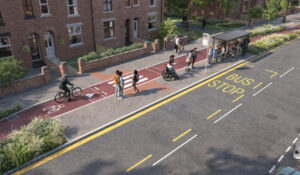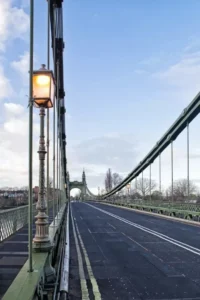The government’s decision this month to slash the budget for cycling and walking in England by more than 50% could cost more than £2bn in the long term through its impact on public health and the wider economy, a Labour analysis has estimated.
The £380m cut to the active travel budget in the current spending review, which has two more years to run, has already been condemned by campaign groups as shortsighted and damaging, reports the Guardian in an exclusive article.,
In a wider announcement on travel spending focused mainly on delays to the HS2 rail project, Mark Harper, the transport secretary, had said that of £710m pledged on active travel in the 2021 spending review, just £100m more would be spent.
So far £230m has been spent, amounting to a £380m reduction.
Labour used the Department for Transport’s (DfT) own analysis, which says that active travel investments have a “very high” expected benefit-to-cost ratio of £5.62 per £1 spent, said the Guardian report.
This is in part because of improvements to areas such as road safety and pollution if more people walk or cycle rather than drive, but also because of the significant health impact of people becoming more physically active. The DfT report notes that active travel is a particularly good way for people to embed activity into their everyday lives.
Labour said this benefit-to-cost ratio meant the budget cut would end up costing £2.1bn in the longer term.
Louise Haigh, the Shadow Transport Secretary, said: “This shortsighted decision shows the Conservatives are out of ideas, and out of time. Not only will this harm public health and hit air quality, but it will cost the taxpayer too.
“The government’s own analysis shows that investment in walking and cycling has huge benefits for public health and the economy – and now it has become the latest in a long line of broken promises.”
Cycling UK said the cut meant the government had “effectively devastated the legacy of successive Conservative administrations and their work to get Britain cycling”.
Sarah Mitchell, the campaign group’s chief executive, said: “At a time when people are faced with a cost of living crisis where they are questioning their transport choices, making cycling and walking easier is a cost-effective area for government investment.
“Cycle lanes are cheap to build, and the consequent uptake in health and wellbeing benefits are well documented, as are the impact on reducing emissions when we have people drive less and cycle more for shorter journeys.
“Government should be providing more for active travel not cutting it. This funding decision is disastrous, and will set back the growth of cycling and walking in England for another decade at least.”
A DfT spokesperson said the department “do not recognise these figures”.
They added: “That is why the government has committed £850m in the last three years to the active travel fund and, despite inflationary pressures, this investment will rise to £3bn in total by 2025.”
























